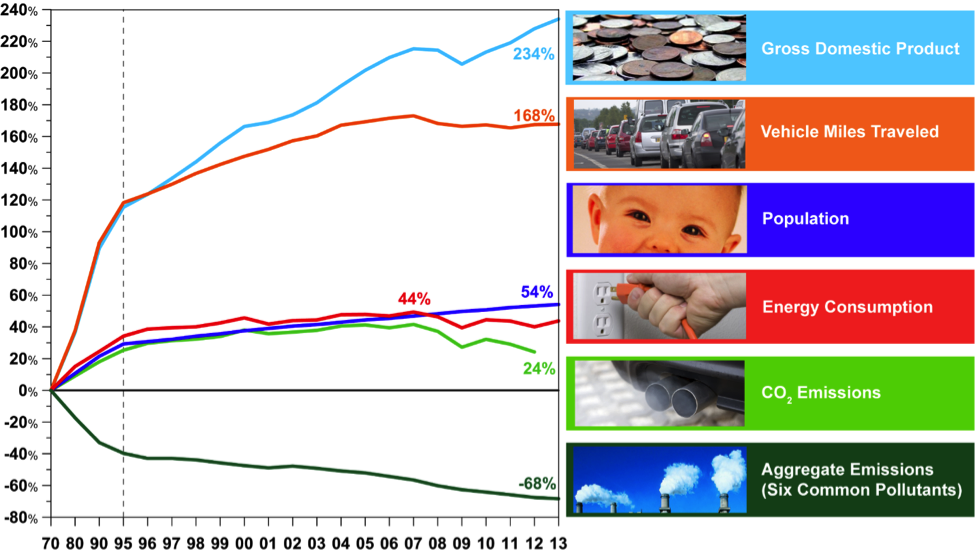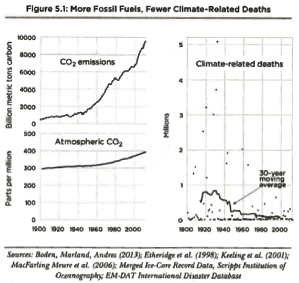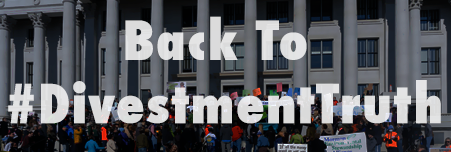What is the Fossil Fuel Divestment Movement?
The fossil fuel divestment movement is a group of radical activists out to convince people and institutions to divest their stock holdings in fossil fuel companies. So far, the main focus of the movement has been to get college students to pressure boards of trustees into dumping fossil fuel-related stocks from their endowments. These activists claim that the companies exploring for and producing natural gas, oil, and coal are destroying the planet, and that divesting from them is a “moral” cause.
The fossil fuel divestment movement, however, has it backwards. The morally superior choice is for people to be free to use energy to make their lives better. Today, that means having access to the abundant energy resources of coal, oil, and natural gas. Those are the technologies that lifted the developed world out of poverty, and they continue to lift millions out of poverty while they power the high-energy lives of those of us fortunate enough to live in the developed world.
Upon careful consideration of the benefits and costs to society of using coal, oil, and natural gas, it is clear that the overall impact of these technologies is hugely positive. Rather than protesting these fuels, activists who understand the big picture should praise them and the great benefits they bring to the world. Unfortunately, the divestment movement does not appear to be interested in helping to elevate humanity out of poverty or improving people’s lives. Instead, the movement is on a crusade to dismantle the technologies and products essential to modern life.
History of the Movement
Fossil fuel divestment is the brainchild of climate activist Bill McKibben. In a 2012 Rolling Stone article titled Global Warming’s Terrifying New Math, McKibben laid out his case for using dramatically less coal, oil, and natural gas (practically none). This article was also the most prominent place anyone had discussed using fossil fuel divestment as a political strategy, an idea he fleshed out in a later article.
Thus far, McKibben’s divestment strategy has focused largely on spurring action on college and university campuses. The divestment movement is geared toward campuses because, according to McKibben, “with Washington blocked, campuses are suddenly a front line in the climate fight—a place to stand up to a status quo that is wrecking the planet.”
The vast majority of University administrations, however—concerned with maintaining endowments that support everything from tuition assistance to classrooms themselves—have not given in. The leaders of Harvard, Georgetown, Tufts, Tulane, American, and Duke Universities, among others, have all rejected student groups’ calls to divest. Even though major universities are not biting, the movement does maintain a list of “commitments” on the site GoFossilFree.org, mostly from small schools, local governments, and churches. The movement is alive, but has yet to catch on with mainstream institutions.
Right now, people in the divestment movement are promoting “Global Divestment Day,” a two-day event meant to rouse collective action in support of fossil fuel divestment. The movement’s website describes the goals of the event as:
Individuals will close their accounts with banks and pension funds investing in climate chaos. University and college students will hold flash-mobs, vigils, sit-ins and rallies calling upon their endowments to invest in a liveable future. Faith leaders and people living on the frontline of climate change will band together to urge their communities to divest from climate destruction. In financial capitals, people will gather for colourful rallies calling on investors to break up with the fossil fuel industry and sever their ties once and for all.
Divestment Day is the latest ploy in a movement that, unfortunately, fails to consider the needs of the world’s poor and American families.
The Movement’s Core Beliefs
The fossil fuel divestment movement believes that coal, oil, and natural gas are destroying our planet through catastrophic climate change. The movement, however, ignores what the actual Intergovernmental Panel on Climate Change (IPCC) reports say about climate and economics. As IER’s economist Robert Murphy has explained:
[the] popular climate goal—limiting global warming to 2°C—isn’t even close to being justified by the year 2050, and even by the year 2100 cannot be justified using the scant evidence in the IPCC report. This is because—using the IPCC’s own projections—the economic costs suffered by businesses and households to comply with emissions reductions exceed the estimated environmental damages from warming.
In other words, the divestment movement is rejecting the IPCC’s climate science. Even the IPCC recognizes that energy from coal, oil, and natural gas has benefits.
Besides not trusting the IPCC, the fossil fuel divestment movement also doesn’t trust people to make their own decisions. As McKibben said in his Rolling Stone piece:
Most of us are fundamentally ambivalent about going green: We like cheap flights to warm places, and we’re certainly not going to give them up if everyone else is still taking them. Since all of us are in some way the beneficiaries of cheap fossil fuel, tackling climate change has been like trying to build a movement against yourself – it’s as if the gay-rights movement had to be constructed entirely from evangelical preachers, or the abolition movement from slaveholders.
McKibben here realizes that natural gas, coal, and oil are so useful that people will not voluntarily stop using them. In other words, people are not willing to make that tradeoff on their own when they have a clear picture of the benefits of these fuels. That’s why McKibben is attacking the companies that make these fuels—to drive up the costs so that people won’t use them anymore. The best way to do that, according to McKibben, is to polarize and demonize natural gas, coal, and oil companies.
The Fossil Fuel Divestment Strategy
McKibben is clear about his strategy, which he took straight out of Saul Alinsky’s Rules for Radicals. In fact, McKibben calls it a “fine book” and a “classic” on his blog. As McKibben wrote in Rolling Stone:
A rapid, transformative change would require building a movement, and movements require enemies… [W]e need to view the fossil fuel industry in a new light. It has become a rogue industry, reckless like no other force on Earth. It is Public Enemy Number One to the survival of our planetary civilization.
Alinsky’s book is remarkably combative, and Alinsky consistently refers to people and groups who disagree with him politically as “the enemy” and “the target.” The book uses war terminology in the ideological context. Two of Alinksy’s Rules appear to be key to the divestment strategy, which is an ideological war against companies that produce natural gas, coal, and oil.
#5: “Ridicule is man’s most potent weapon.” There is no defense. It’s irrational. It’s infuriating. It also works as a key pressure point to force the enemy into concessions.
#12: “‘Pick the target, freeze it, personalize it, and polarize it.’ Cut off the support network and isolate the target from sympathy.”
By ridiculing natural gas, coal, and oil companies as “Public Enemy Number One”—destructive of the planet itself—divestment activists try to force companies into defensive positions for which there is no defense (no one is arguing that we should destroy the planet). Further, by trying to isolate and polarize these companies, and by focusing exclusively on negative side effects, activists try to make a single enemy out of thousands of diverse businesses that provide essential energy to billions of people. Under the framework assembled by Alinsky and through his militant lens, “the fossil fuel industry” is a single, evil thing—a target to be destroyed.
There is no unitary “fossil fuel industry.” There are, however, thousands of companies and millions of individuals making decisions on what energy and how much to produce. In the U.S., those decisions resulted in about 80 percent of our energy coming from natural gas, coal, and oil in 2014. There is no “Public Enemy Number One” in reality unless that public enemy is the ability of billions of people to make their own energy decisions. It is much easier for McKibben and other divestment activists to demonize a single fictitious entity than the concept of freedom of choice. It is also incredibly disingenuous.
Divestment Activists Are Wrong: Fossil Fuels Are Good
The ability to use natural gas, coal, and oil is not “Public Enemy Number One,” nor is it even a necessary evil. Rather, it is an absolutely necessary good. After all, in the United States as we have used more of these sources, the economy has become healthier and we have reduced air pollution.
The following chart is from EPA’s Air Quality Trends Report. It shows that as the economy has grown, people have driven more, more energy has been consumed, and total pollution emissions have actually dropped. In fact, total pollution emissions are down by 68 percent since 1970 alone:
From 1970 to 2013, the consumption of energy from coal increased 47 percent, the consumption of energy from natural gas increased 23 percent, and the consumption of energy from oil increased 17 percent. Despite increased energy use from sources that divestment activists want to eliminate, air quality dramatically improved. One of the reasons for this environmental improvement is that using more natural gas, coal, and oil created greater wealth and a healthier economy, which enabled better pollution control technologies.
The world is a much better, safer, easier place to live because of the ways we have used natural gas, coal, and oil resources. McKibben and divestment activists predict climate disaster at some future date, but as noted above, they actually reject the IPCC’s reports on climate and ignore the positive trends in the environment.
In reality, far fewer people die today than in decades past from climate-related events. That is because we make ourselves safer and more resilient all the time by building better buildings, better infrastructure, better everything—and we do all of that with modern energy, the vast majority of which comes from natural gas, coal, and oil.
The following graph from energy expert Alex Epstein’s The Moral Case for Fossil Fuels demonstrates how the best measure of climate danger—deaths from climate-related causes—is lower now than at any point in human history as our use of natural gas, coal, and oil has steadily increased:[1]
(Source: Moral Case for Fossil Fuels, page 121)
What does this graph tell us? That the more natural gas, coal, and oil the world uses, the safer we become. This is true because building a safe civilization is an energy-intensive process that requires significant amounts of reliable energy. Having access to the best energy sources available—which are natural gas, coal, and oil in much of the world—is the best way to keep developing and keep making the world a safer, more comfortable place.
The President of Harvard University, Drew Faust, explained how important natural gas, coal, and oil products are to our lives, in his statement rejecting divestment at the university:
I also find a troubling inconsistency in the notion that, as an investor, we should boycott a whole class of companies at the same time that, as individuals and as a community, we are extensively relying on those companies’ products and services for so much of what we do every day. Given our pervasive dependence on these companies for the energy to heat and light our buildings, to fuel our transportation, and to run our computers and appliances, it is hard for me to reconcile that reliance with a refusal to countenance any relationship with these companies through our investments. [Emphasis added]
There is a reason people keeping using these energy sources. Natural gas, coal, and oil companies have been responsible for bringing light to places that were once dark, keeping schools air-conditioned in countries with severe heat stress, powering incubators that save the lives of premature children, and refrigerating food and medicine, among countless other contributions. Far from being “Public Enemy Number One,” we should acknowledge the “fossil fuel industry” for what it really is—not one evil entity but millions of individuals working for thousands of companies supplying the world with the energy people are clamoring for.
All technologies come with both benefits and costs of some kind. For example, the wind and solar industries that divestment activists tout as solutions kill hundreds of thousands of birds and bats annually and industrialize large amounts of land. Examined holistically, the benefits of natural gas, coal, and oil use overwhelmingly outweigh the costs. Divesting from these fuels means much more than simply purging one’s assets of the stocks of a few companies—it means turning one’s back on the resources that make modern civilization possible.
The Morality of Choice
Using the combative language of Saul Alinsky and the divestment movement, the real “enemy” or “target” here is the divestment movement. Activists like Bill McKibben have demonized the choices that billions of people have made in choosing reliable, affordable energy from natural gas, coal, and oil. These modern energy sources make our standard of living possible. The divestment movement is simply dead wrong about natural gas, coal, and oil. It’s as if they are morally opposed to modern life itself.
The moral alternative is the growth, prosperity, safety, environmental improvements, and overall human flourishing that comes with the freedom to use the best energy resources to improve our lives. If the divestment movement succeeded in killing “Public Enemy Number One,” it would consign billions of people to poverty and unnecessary misery. Divestment activists pretend to have the moral higher ground, but consigning billions of human beings to abject poverty is simply a morally bankrupt position. We hope their efforts fail spectacularly so we can continue improving our lives with the best energy sources available.
AEA Economist Travis Fisher authored this post.
[1] Alex Epstein, The Moral Case for Fossil Fuels, New York, NY: 2014, page 121.




Speak Your Mind